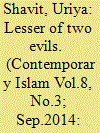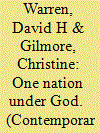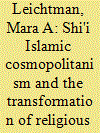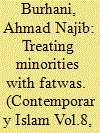|
|
|
Sort Order |
|
|
|
Items / Page
|
|
|
|
|
|
|
| Srl | Item |
| 1 |
ID:
134221


|
|
|
|
|
| Publication |
2014.
|
| Summary/Abstract |
Through an analysis that focuses on wasati and salafi fatwas, but searches also beyond them, this article demonstrates the emergence of a broad agreement (albeit not a consensus) in Islamic jurisprudence on the permissibility of political participation in the West. This broad agreement is based primarily on jurists' evaluation, drawing on 'fiqh al-muwazanat' (the jurisprudence of balances) that, in some cases, participation brings more benefit (maslaha) than harm (mafsada). The article comparatively examines wasati and salafi approaches to politics and to Muslim minorities to explain why jurists who disagreed on other fundamental issues in the field of fiqh al-aqalliyyat al-Muslima (the religious law of Muslim minorities) reached similar (but not identical) conclusions on political participation. Based on this analysis, a revision of some prevailing categorizations of salafiyya is suggested. Deliberations by some salafis, jihadi-salafis and members of Hizb al-Tahrir who oppose political participation and their refutations of the justifications invoked by jurists who legitimized it are also examined.
|
|
|
|
|
|
|
|
|
|
|
|
|
|
|
|
| 2 |
ID:
134220


|
|
|
|
|
| Publication |
2014.
|
| Summary/Abstract |
In the wake of the Arab Revolutions of 2011, countries in the Middle East are grappling with how Islamists might be included within a regime of democratic political pluralism and how their aspirations for an "Islamic state" could affect the citizenship status of non-Muslims. While Islamic jurisprudence on this issue has traditionally classified non-Muslims in Islamic society as protected peoples or dhimma, endowed with what the authors term "minority citizenship", this article will examine how the transnational intellectual Wasa?iyya or Centrist movement, of which Sheikh Yusuf al-Qaradawi is the figurehead, have sought to develop a new fiqh of citizenship in which Muslims and non-Muslims have equal civil and political rights. This article will focus on Yusuf al-Qaradawi on the basis that his very recent shift in 2010 on the issue is yet to be studied in depth, as well as in view of the fact that the dilemma faced by reformist Islamic scholars-how to integrate modern concepts into a legal tradition while simultaneously arguing for that tradition's continuing relevance and authority-is for him rendered particularly acute, given that this tradition is itself the very source of his own authority and relevance. It will therefore be argued that the legacy of the Islamic legal tradition structures his discourse in a very specific way, thereby having the potential to render it more persuasive to his audience, and worthy of a more detailed examination.
|
|
|
|
|
|
|
|
|
|
|
|
|
|
|
|
| 3 |
ID:
134222


|
|
|
|
|
| Publication |
2014.
|
| Summary/Abstract |
Senegalese "conversion" to Shi'i Islam resulted from cosmopolitan interactions with West Africa's resident Lebanese population and Iranian revolutionary ideologies. Shi'i advocates spread their religious convictions through teaching, conferences, holiday celebrations, and media publicity. Key to their success are libraries full of Arabic and French texts from Iran and Lebanon. Inherent in Islamic education is the authority bestowed on those who are knowledgeable, and with the spread of religious knowledge through books, media, and the Internet comes a broadening of the scope of religious authority and resulting conflict with or accommodation of old political communities. Senegalese converts to Shi'i Islam use their literacy in Arabic and individually acquired libraries of Islamic legal books to bypass the authority of Sufi marabouts. Some keep their feet in both Sunni and Shi'i worlds, and their ability to compare religious texts of both traditions wins them disciples. Shi'i minorities claim autochthony and authenticity in Senegal through narrating revisionist historical accounts of the spread of (Shi'i) Islam to Africa. Conferences commemorating the martyrdom of Imam Husayn during the Shi'i mourning period in the month of Muharram target Sufi Muslims who also love the family of the Prophet. Shi'i leaders skillfully detach this foreign religious ideology from Middle Eastern politics and make this branch of Islam relevant to Senegalese through establishing religious centers as NGOs, which work to bring health care and economic development to neighborhoods in the name of Shi'i Islam.
|
|
|
|
|
|
|
|
|
|
|
|
|
|
|
|
| 4 |
ID:
134223


|
|
|
|
|
| Publication |
2014.
|
| Summary/Abstract |
The term "minority religious community" in the Muslim country of Indonesia refers not only to those embracing religions other than Islam, but also to minority groups like the Ahmadiyya. Recently, the treatment of Ahmadis has been worse than the treatment of non-Muslims. This article, therefore, intends to study the status of 'deviant' groups under Islamic law and the treatment of them in Muslim society. Specifically, this article addresses the following questions: How did ulama in the past define and treat minority groups? How do contemporary Sunni ulama define and treat the Ahmadiyya? What is the status of this group under Islamic law? Are they apostates, heretics, or unbelievers? And what are the legal consequences of these charges? To answer these questions, this article employs two methods. First, for theoretical treatment of minority groups in the past, this article focuses its analysis on al-Ghaz?li's Fay?al al-tafriqa and Fa??'i? al-b??iniyya. Second, following a discussion of classical Islam, the article moves to contemporary time by analyzing fatwas against the Ahmadiyya from five institutions: the R?bi?a al-'?lam al-Isl?m?, Majelis Ulama Indonesia (MUI), Muhammadiyah, Council of the Islamic Fiqh Academy of the Organization of Islamic Cooperation (OIC), and Nahdlatul Ulama (NU). This article argues that, first, fatwas against the Ahmadiyya issued by these institutions were intended as a device to sustain orthodoxy of umma and, second, orthopraxy or devoutness in observing religious rituals, as practiced by the Ahmadis, does not exempt them from the charge of apostasy because theologically they are believed to deviate from orthodox beliefs.
|
|
|
|
|
|
|
|
|
|
|
|
|
|
|
|
|
|
|
|
|